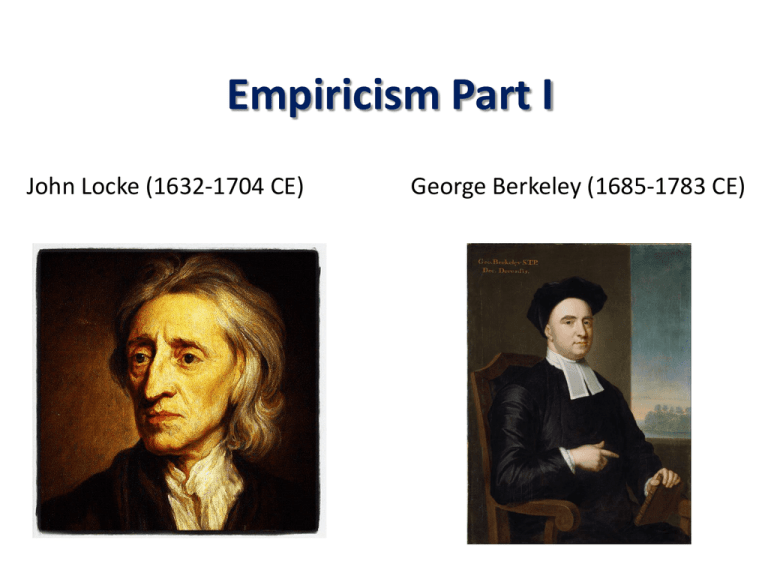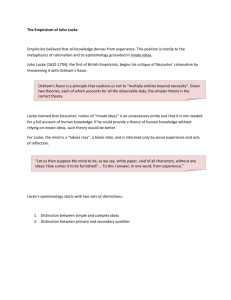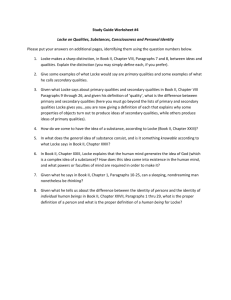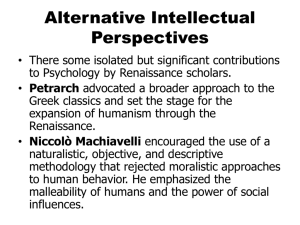Empiricism Part I
advertisement

Empiricism Part I John Locke (1632-1704 CE) George Berkeley (1685-1783 CE) Aristotle Locke’s Method Ockham’s (or Occam’s) Razor. Principle of parsimony, economy, succinctness: “What can be done in fewer [terms] is done in vain with more.” Given competing hypotheses, the hypothesis with the fewest assumptions that adequately explains should be selected. Oh my word, I’ve found a $20 bill on the ground: God must be rewarding me for good behavior OR I must have good karma. The TV show Jackass must be secretly filming me, and they placed the bill in my path hoping I’ll reach down to pick it up just as they yank an invisible string and pull the bill out of my reach. Someone must have dropped it, and I found it. Ockham’s Razor & Rationalism What assumptions must one accept for Plato’s Forms and the rationalists’ “innate ideas” to be valid? • Descartes’ pineal gland. • Spinoza’s immanent God. • Leibniz’s coherence rooted in an omni-everything, always-perceiving God. Starting Point All knowledge is a posteriori. Born as “blank slate” or “tabula rasa.” Experience “writes” on the blank slate, creating knowledge. Ideas: Conceptualized Experiences Simple Ideas Cannot be broken down into component parts. – – – – – Solidity. Yellow. Mass. Shape. Motion. Usually come in through one sense (but some things, like motion, may be seen and felt) Complex Ideas Compounds of simple ideas. – A man, an army, beauty, gratitude, the universe. Ideas of Relations. – Smaller, taller, anterior. Abstractions/Generalizations. – Blueness, fatness, friendliness. The Stuff of Thought Secondary Qualities Characteristics not inherent to the object but power of objects to produce sensations in observer. Primary Qualities Characteristics that inhere in material bodies. Characteristics cause our awareness. Qualities that can be measured. Naïve Realism vs. Cartesian Realism vs. Representative Realism Representative Realism There is a world “out there.” The mind experiences a “representation” of this world but not the world itself. Some features of the world are correctly represented (primary qualities); some aspects of the representation are features of the mind (secondary qualities). Locke’s Substance Problem If what we experience are qualities of the material world, what is the “stuff” of the world “out there” that possesses the qualities? A real quality must be a quality of a real thing. “So that if anyone will examine himself concerning his notion of pure substance in general, he will find he has no other idea of it at all, but only a supposition of he knows not what support of such qualities which are capable of producing simple ideas in us.” George Berkeley (1685-1753 Dublin) Like’s Locke’s method but not Locke’s errors and inconsistencies. Especially liked Locke’s use of Ockham’s Razor. The “Thing” Problem Locke: “Since the mind, in all its thoughts and reasonings, hath no other immediate object but its own ideas, which it alone does or can contemplate, it is evident that our knowledge is only conversant about them.” Correction #1: Primary & Secondary Qualities Descriptions of primary qualities are just interpretations of secondary qualities. Therefore, primary qualities exist only in the mind. Take away color, texture, taste, sound, odor…. What’s left? Correction #2: Esse Est Percipi (to be is to be perceived) Direct (or immediate) perception: passive reception of sense data. Indirect (mediate) perception: interpretation of sense data. Things, in so far as they are “things,” exist as sense data or as interpretations of sense data (they exist as perceptions). Which is to say…. Esse Est Percipi The physical world does not exist independently of consciousness. The physical world is experienced and understood as sense data. Representation is reality. Two Implications Sense data appear in recognizable patterns. Explains how people cut up and discuss the world differently (so much for innate knowledge). Language helps unify ideas in our minds. Language builds community. “Reality” Results from Consensus of Sense Data Interpretation In a world with more than one person, collective interpretation of sense data constitutes reality. In a world with one person, individual interpretation of sense data constitutes “reality.” What Causes Sense Data? Where Does It Come From? Descartes and Locke assume an “out there,” a physical world of mysterious “stuff.” Berkeley eliminates “out there” with Ockhams’ Razor. If esse est percipi, then does something cease to exist when no one is perceiving it? God: The Eternal Perceiver Esse Est Percipi and God Can God be perceived? If so, how? And by whom? If not, does he exist? Berkeley’s Solution to Problem of Self and God: Self and God are “Notions” not “Ideas” “But besides all that endless variety of ideas or objects of knowledge, there is likewise something which knows or perceives them; and exercises diverse operations, as willing, imagining, remembering about them. This perceiving active being is what I call mind, spirit, soul, or myself….” [but this “something” cannot be perceived]






![Some Qualities of a Good Teacher[1]](http://s2.studylib.net/store/data/005352484_1-a7f75ec59d045ce4c166834a8805ba83-300x300.png)




